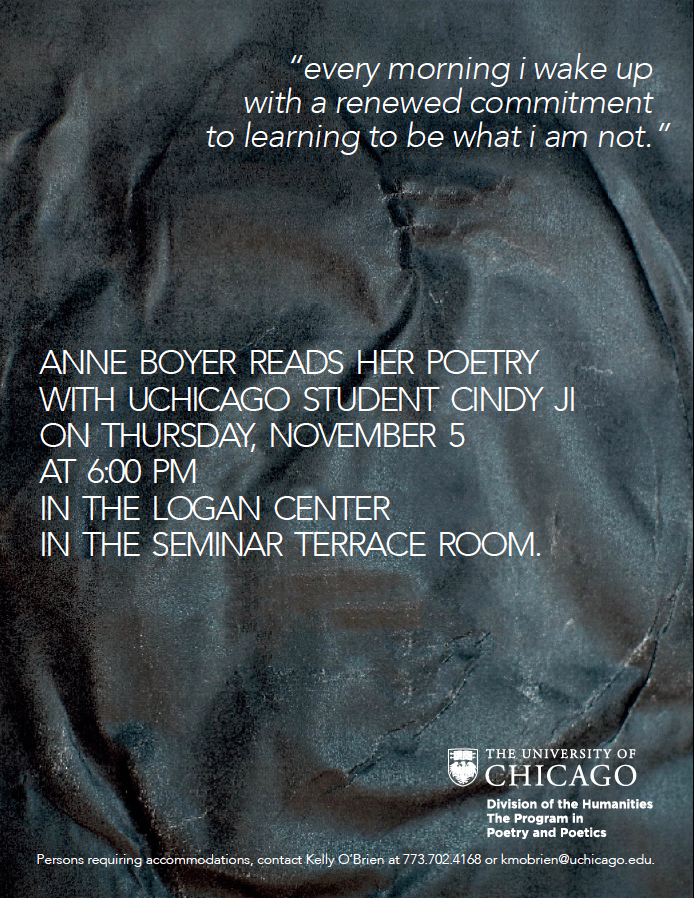LIT AGAINST US (ON ANNE BOYER)
In honor of her recent reading here in Chicago I wrote the following for Anne Boyer: Literature is against us. Which us? The us of unpaid reproductive labor. The us with a strap affixed to our shoulders. The us of those on the nether side of consumption. The us that lives in Colonial Gardens, on the night of the chemical spill. The us that needs and refuses the feeds. The us that reads literature and is sick with its prescriptors of “natural repugnance” to itself: who begins to write with her needle, as Rousseau dictates, an O, before seeing herself in a mirror, and covering her sex. The us that struggles to be a person who can think and write regardless. That reads into the O a planet, a bruise, and Xs out the days of sick leave and bourgeois eternity at once.
I read Garments Against Women, Anne Boyer’s latest book from Ahsahta Press, and think of Zora Neale Hurston speaking of her blackness and implicitly of her femininity as a throttling frock: “it was fitting like a tight chemise,” Hurston writes. “I couldn't see it for wearing it. It was only when I was off in college, away from my native surroundings that I could see myself like somebody else and stand off and look at my garment. Then I had to have the spyglass of Anthropology to look through.” It’s words nevertheless that enable her to turn away from the discursive structures that cloak her, exercisings in constraint whose negative spaces call for occupation. Refusal is also a touching, against. This contradiction is one Anne Boyer bravely and continuously confronts in her writing, from the 2008 The Romance of Happy Workers, from Coffee House Press—which CA Conrad delectably described as “making me a compulsory vacuum”—to the forthcoming Money City Sick as Fuck from Flowers & Cream, and many many lines online and unbound. I am indebted to Anne Boyer for making it possible to make literature out of everything that would make it impossible for a me of the sort to write or even read.
Anne Boyer says of this latest book’s genesis: “I wanted to figure out some way to live as something more than information. I wanted to figure out some way to write what we need that wasn’t going to turn it into a pornography of particularization.” Garments Against Women transcribes the scene of that figuring. The poet turns away from the garment that is literature, her tendriling of culture, and begins to work with needle and thread, absorbed in the hours of a garment worker’s life held by each piece of fabric, each pattern, each seam. She summons Emma Goldman in her cell, asking for her jailers to at least bring her some sewing. She tackles the problem scores of anonymous women have tackled before in joining pieces so that they “might correctly encase an eternally irregular, perspiring and breathing three-dimensional object that cannot cease its motion.” She takes up the needle again, the pen, with a vengeance. In motion.
In more recent writings on what Anne Boyer names the “hypercapitalist disease of cancer,” she has exposed further brutalities of swaddling, of care, and its excision from visibility. She has in observation ablaze contoured their calamitous intellectual consequences, which seem to point only toward the best-case scenario of becoming one further author of triumph in a neoliberal narrative market propped up on the Survivor done up in data, in pink. I would write an essay on this crucial emerging work now too but I need to release her to fill this space, and so will repeat her apparently simple synopsis from a speculative interview with Felix Bernstein: “My practice is all death and destruction, now,” “though mainly because that was done to me, like how I still write though many days I can’t even remember the word for “thing.””
To make of excision a cenotaph rent. “I kept checking the social fabric for the hole I’d burned.” We are deeply indebted to Anne Boyer, whose bio line defines herself as “a poet who lives in Kansas,” for keeping those flames going across the plains and all their contradictions.
